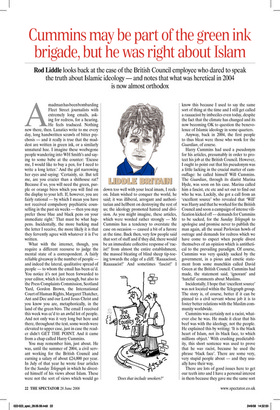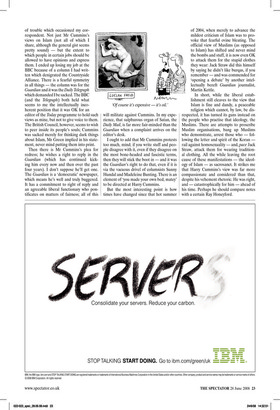Cummins may be part of the green ink brigade, but he was right about Islam
Rod Liddle looks back at the case of the British Council employee who dared to speak the truth about Islamic ideology — and notes that what was heretical in 2004 is now almost orthodox Amadman has been bombarding Fleet Street journalists with extremely long emails, asking for redress, for a hearing. He feels traduced. Nothing new there, then. Lunatics write to me every day, long handwritten scrawls of bitter psychosis — and it really is true that the maddest are written in green ink, or a similarly unnatural hue. I imagine these woebegone people wandering into WH Smith’s and saying to some babe at the counter: ‘Excuse me, I would like to buy a pen, for I need to write a long letter.’ And the girl narrowing her eyes and saying: ‘Certainly, sir. But tell me, are you crazier than a shithouse rat? Because if so, you will need the green, purple or orange biros which you will find on the display to your left. If, however, you are fairly rational — by which I mean you have not received compulsory psychiatric counselling in the past six weeks — then you may prefer those blue and black pens on your immediate right.’ That must be what happens. Incidentally, the more barking mad the letter I receive, the more likely it is that they fervently agree with whatever it is I’ve written.
What with the internet, though, you require a different recourse to judge the mental state of a correspondent. A fairly reliable giveaway is the number of people — and indeed the lateral, qualitative spread of people — to whom the email has been cc’d. You notice it’s not just been forwarded to your editor, which is fair enough, but also to the Press Complaints Commission, Scotland Yard, Gordon Brown, the International Court of Human Rights, Margaret Thatcher, Ant and Dec and our Lord Jesus Christ and you know you are, metaphorically, in the land of the green biro. The email I received this week was cc’d to an awful lot of people. And not only was it very long but here and there, throughout the text, some words were elevated to upper case, just in case the reader didn’t GET THE POINT. And it came from a chap called Harry Cummins.
You may remember him, just about. He was, until the summer of 2004, a civil servant working for the British Council and earning a salary of about £24,000 per year. In July of that year he wrote four articles for the Sunday Telegraph in which he divested himself of his views about Islam. These were not the sort of views which would go down too well with your local imam, I reckon. Islam wished to conquer the world, he said; it was illiberal, arrogant and authoritarian and hellbent on destroying the rest of us; the ideology promoted hatred and division. As you might imagine, these articles, which were worded rather strongly — Mr Cummins has a tendency to overstate the case on occasion — caused a bit of a furore at the time. Back then, very few people said that sort of stuff and if they did, there would be an immediate collective response of ‘racist!’ from almost the entire establishment, the massed bleating of blind sheep tip-toeing towards the edge of a cliff. ‘Raaaacissst, Raaaaacist!’ And sometimes ‘fascist!’ I know this because I used to say the same sort of thing at the time and I still get called a raaaacisst by imbeciles even today, despite the fact that the climate has changed and its now becoming OK to question the benevolence of Islamic ideology in some quarters.
Anyway, back in 2004, the first people to thus bleat were those who work for the Guardian, of course.
Harry Cummins had used a pseudonym for his articles, presumably in order to protect his job at the British Council. However, I ought to point out that his pseudonym was a little lacking in the crucial matter of camouflage: he called himself Will Cummins. The Guardian, through its diarist Marina Hyde, was soon on his case. Marina called him a fascist, etc etc and set out to find out who he was. Luckily, she got a call from an ‘excellent source’ who revealed that ‘Will’ was Harry and that he worked for the British Council and soon a campaign of intense vilification kicked off — demands for Cummins to be sacked, for the Sunday Telegraph to apologise and promise never to publish the man again, all the usual Pavlovian howls of outrage and demands for redress which we have come to expect when people divest themselves of an opinion which is antithetical to the prevailing paradigm. Of course, Cummins was very quickly sacked by the government, in a pious and emetic statement from some munchkin called David Green at the British Council. Cummins had made, the statement said, ‘ignorant’ and ‘hateful’ comments about Muslims.
Incidentally, I hope that ‘excellent source’ was not located within the Telegraph group. The story is, of course, better if it can be pinned to a civil servant whose job it is to foster better relations with the Muslim community worldwide.
Cummins was certainly not a racist, whatever else he was. He made it clear that his beef was with the ideology, not the people. He explained this by writing: ‘It is the black heart of Islam, not its black face, to which millions object.’ With crushing predictability, this short sentence was used to prove that he was racist, because he used the phrase ‘black face’. There are some very, very stupid people about — and they usually have their way.
There are lots of good issues here to get our teeth into and I have a personal interest in them because they gave me the same sort of trouble which occasioned my correspondent. Not just Mr Cummins’s views on Islam (not all of which I share, although the general gist seems pretty sound) — but the extent to which people in certain jobs should be allowed to have opinions and express them. I ended up losing my job at the BBC because of a column I had written which denigrated the Countryside Alliance. There is a fearful symmetry in all things — the column was for the Guardian and it was the Daily Telegraph which demanded I be sacked. The BBC (and the Telegraph) both held what seems to me the intellectually incoherent position that it was OK for an editor of the Today programme to hold such views as mine, but not to give voice to them. The British Council, however, seems to wish to peer inside its people’s souls; Cummins was sacked merely for thinking dark things about Islam, Mr Green implied in his statement, never mind putting them into print.
Then there is Mr Cummins’s plea for redress; he wishes a right to reply in the Guardian (which has continued kicking him every now and then over the past four years). I don’t suppose he’ll get one. The Guardian is a ‘democratic’ newspaper, which means he’s well and truly buggered. It has a commitment to right of reply and an agreeable liberal functionary who pontificates on matters of fairness; all of this will militate against Cummins. In my experience, that sulphurous organ of Satan, the Daily Mail, is far more fair-minded than the Guardian when a complaint arrives on the editor’s desk.
I ought to add that Mr Cummins protests too much, mind; if you write stuff and people disagree with it, even if they disagree on the most bone-headed and fascistic terms, then they will stick the boot in — and it was the Guardian’s right to do that, even if it is via the vacuous drivel of columnists Sunny Hundal and Madeleine Bunting. There is an element of ‘you made your own bed, matey’ to be directed at Harry Cummins.
But the most interesting point is how times have changed since that hot summer of 2004, when merely to advance the mildest criticism of Islam was to provoke that fearful ovine bleating. The official view of Muslims (as opposed to Islam) has shifted and never mind the bombs and stuff, it is now even OK to attack them for the stupid clothes they wear: Jack Straw did this himself by saying he didn’t like burqas, if you remember — and was commended for ‘opening a debate’ by another intellectually bereft Guardian journalist, Martin Kettle.
In short, while the liberal establishment still cleaves to the view that Islam is fine and dandy, a peaceable religion which cannot, by law, be disrespected, it has turned its guns instead on the people who practise that ideology, the Muslims. There are attempts to proscribe Muslim organisations, bang up Muslims who demonstrate, arrest those who — following the letter and spirit of the Koran — rail against homosexuality — and, pace Jack Straw, attack them for wearing traditional clothing. All the while leaving the root cause of these manifestations — the ideology of Islam — as sacrosanct. It strikes me that Harry Cummins’s view was far more compassionate and considered than that, despite his vehement rhetoric. He was right, and — catastrophically for him — ahead of his time. Perhaps he should compare notes with a certain Ray Honeyford.



















































































 Previous page
Previous page